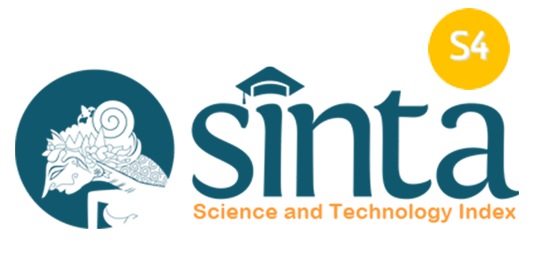Behavioral Intention of Consumer Towards The Existence of Go-Food
Abstract
ABSTRACT
The existence of e-commerce in Indonesia makes it easy for everyone to access and get the products or services they need. One of the e-commerce game changers in Indonesia is GO-JEK which also drives Go-Food as the largest food delivery service currently in Indonesia. This study aims to determine the value of customers to Hedonic Motivation variables, prior Online Purchasing Experience, Time Savings Orientation, and Price Savings Orientation, Motivational Comfort and Usage Utility, Attitude to Online Food Delivery Service (AODS). Behavior Intention on Online Food Delivery Service (BIOFDS), Convenience Motivation, Affects Usage Post-Use. And to know Attitude variable to Online Food Delivery Service. Purposive sampling was used in this study with 400 valid questionnaires which contain 29 items question that have been distributed online. Partial Least Square (PLS) was used in this study. Two variables, price saving orientation to convenience motivation and convenience motivation towards attitude have no positive effect. Convenience motivation has the biggest positive relationship to behavioral intention towards online food delivery service.
Keywords: convenience motivation, post-usage usefulness, attitude towards online food delivery system, behavioral intention towards food delivery system
ABSTRAK
Keberadaan e-commerce di Indonesia memudahkan semua orang untuk mengakses dan mendapatkan produk atau layanan yang mereka butuhkan. Salah satu pengubah permainan e-commerce di Indonesia adalah GO-JEK yang juga menjadikan Go-Food sebagai layanan pengiriman makanan terbesar saat ini di Indonesia. Penelitian ini bertujuan untuk menentukan nilai pelanggan terhadap variabel Motivasi Hedonic, Pengalaman Pembelian Online sebelumnya, Orientasi Penghematan Waktu, dan Orientasi Penghematan Harga, Kenyamanan Motivasi dan Utilitas Penggunaan, Sikap terhadap Layanan Pengiriman Makanan Online (AODS). Niat Perilaku pada Layanan Pengiriman Makanan Online (BIOFDS), Motivasi Kenyamanan, Mempengaruhi Penggunaan Pasca Penggunaan. Dan untuk mengetahui variabel Attitude terhadap Layanan Pengiriman Makanan Online. Purposive sampling digunakan dalam penelitian ini dengan 400 kuesioner yang valid yang berisi 29 item pertanyaan yang telah didistribusikan secara online. Partial Least Square (PLS) digunakan dalam penelitian ini. Dua variabel, orientasi penghematan harga untuk motivasi kenyamanan dan motivasi kenyamanan terhadap sikap tidak memiliki efek positif. Motivasi kenyamanan memiliki hubungan positif terbesar dengan niat perilaku terhadap layanan pengiriman makanan online.
Kata Kunci: motivasi kenyamanan, kegunaan pasca penggunaan, sikap terhadap sistem pengiriman makanan online, niat perilaku terhadap sistem pengiriman makanan
Full Text:
PDFReferences
Chen, Y.-H., Hsu, I.-C., & Lin, C.-C. (2010). Website attributes that increase consumer purchase intention: a conjoint analysis. International Journal of Hospitality Management 43, 1007–1014.
Copeland, M. T. (1923). Relation of consumers’ buying habits to marketing methods. Harvard Business Review, 282-289.
Davis, F. D. (1989, September). Perceived Usefulness, Perceived Ease of Use, and User Acceptance of Information Technology . MIS Quarterly, 13(3), 319-340.
Gentry, L., & Calantone, R. (2002). A comparison of three models to explain shop-bot use on the web. Psychology Mark. 19, 11, 945–956.
GO-JEK Indonesia. (2017). GO-FOOD. Retrieved from GO-JEK:https://www.go-jek.com/go-food/
Indrawati. (2017). Perilaku Konsumen Individu dalam Mengadopsi Layanan Berbasis Teknologi Informasi dan Komunikasi. Bandung, West Java, Indonesia: PT Refika Aditama.
Kotler, P., & Keller, K. L. (2016). Marketing Management 15 Global Edition. Harlow, Essex, London: Pearson Education, Inc.
Laroche, M., Yang, Z., McDougall, G., & Bergeron, J. (2005). Internet versus bricks- and-mortar retailers: an investigation into intangibility and its consequences. Journal of Retailing 81, 4, 251–267.
Li-Ming, A. K., & Wai, T. B. (2013). Exploring Consumers’ Attitudes and Behaviours toward Online Hotel Room Reservations. American Journal of Economics, 3(5C), 6-11.
Mort, G. S., & Rose, T. (2004, March). The effect of product type on value linkages in the means-end chain: implications for theory and method. Journal of Consumer Behavior, 3(3), 221-234.
Rezaei, S., Yeo, V. C., & Goh, S.-K. (2017). Consumer experiences, attitude and behavioral intention toward online food delivery (OFD) services. Journal of Retailing and Consumer Services 35, 150-162.
Stolarski, M., Fieulaine, N., & van Beek, W. (2015). Time Perspective Theory; Review, Research and Application. Switzerland: Springer.
Wagner, G., Schramm-Klein, H., & Steinmann, S. (2016). e-Shopping acceptance: a qualitative and meta-analytic review. Journal of Retailing and Consumer Services.
Yang, Z., Jiang, L., & Jun, M. (2013, April). Measuring Consumer Perceptions of Online Shopping Convenience. Journal of Service Management, 24(2), 191-214.
DOI: https://doi.org/10.29313/performa.v16i2.3596
Refbacks
- There are currently no refbacks.
Copyright (c) 2020 Jurnal Manajemen dan Bisnis: Performa
Jurnal manajemen dan bisnis (Performa) diindeks oleh:
Alamat Redaksi:
Jl. Tamansari 1, Bandung 40116, Jawa Barat, (022) 4203368 pes. 210, (022) 4264064. jmb.performa@gmail.com / jmb.performa@unisba.ac.id

This work is licensed under a Creative Commons Attribution-NonCommercial-ShareAlike 4.0 International License. ISSN 1829-8680 | E-ISSN 2599-0039

_(2).jpg)







